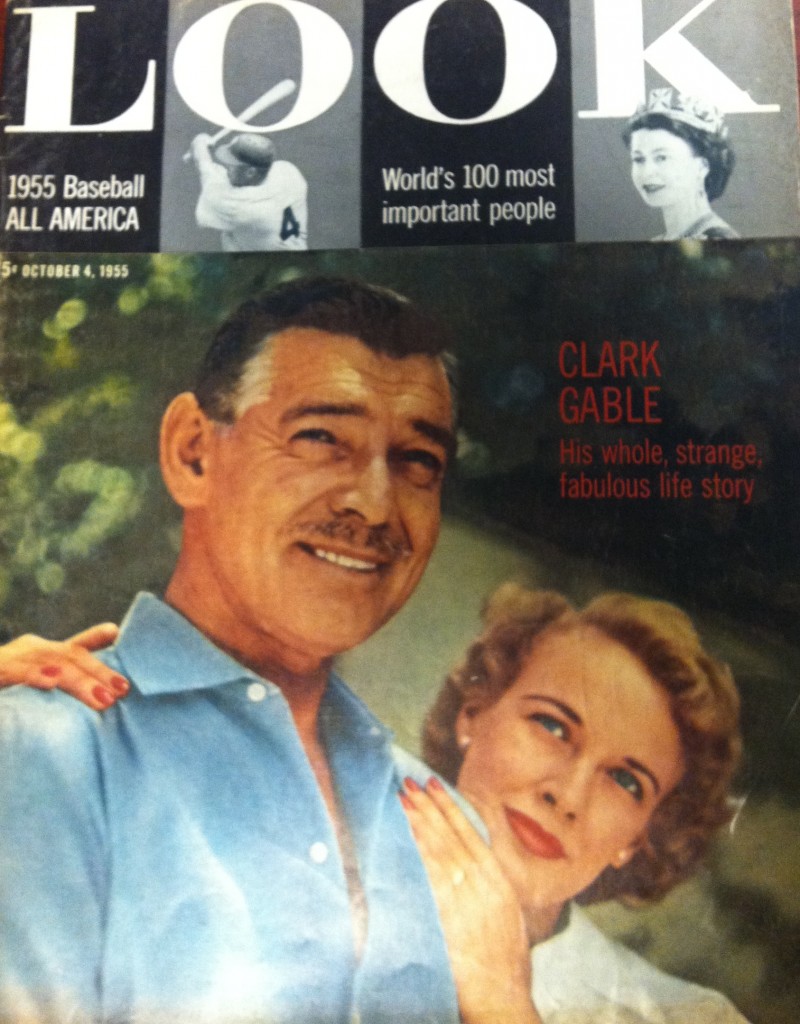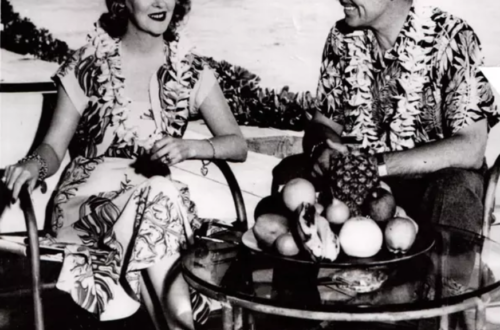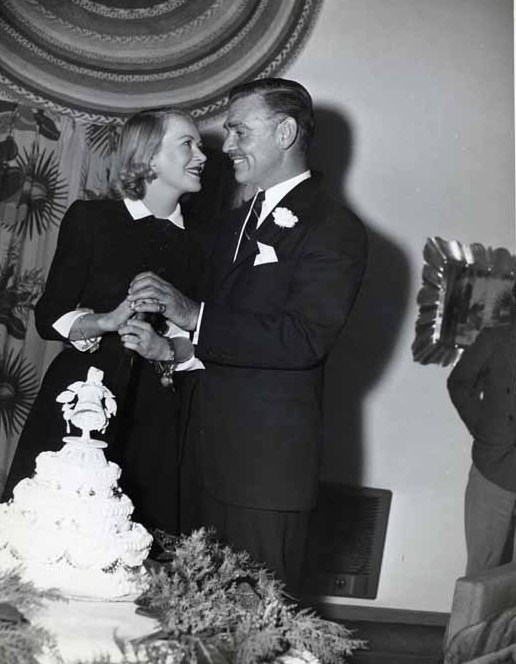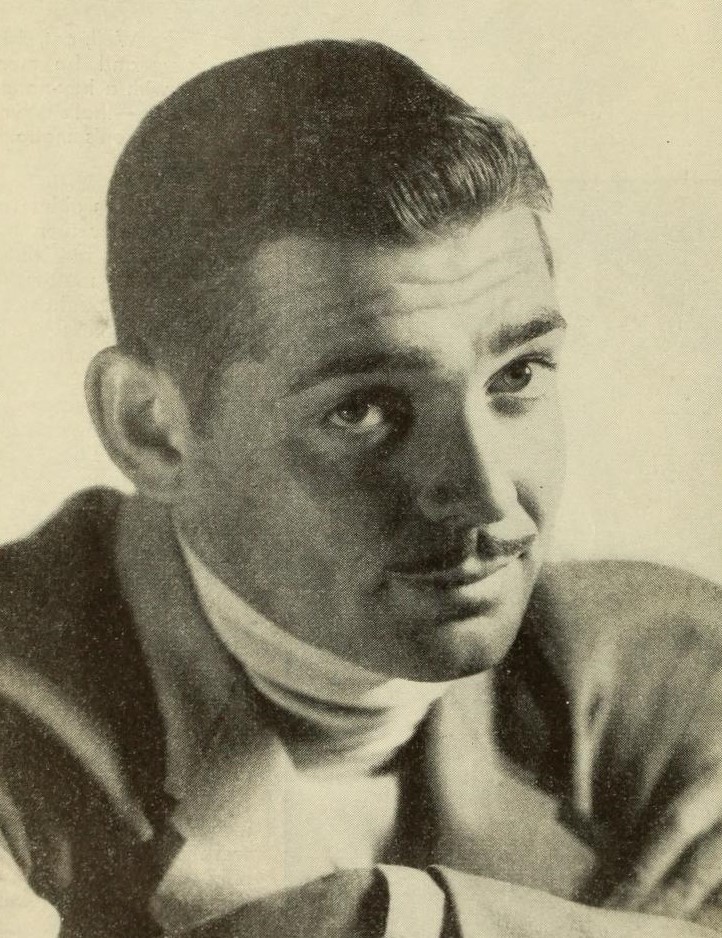{New Article} 1955: Clark Gable: His Life Story
I don’t usually like articles that are titled “Clark Gable’s Life Story.” Typically, depending on the time period, they are either short and fluffy versions of the truth or they are long, bloated and completely boring to Gable fans who already know he came from humble roots in Cadiz, Ohio and worked as an oil driller and telephone lineman. I have one magazine from the 1960’s that has such a story and the article is 25 pages long. I doubt you will ever be seeing that one typed by me and appearing in the archive!
So I wasn’t too optimistic about this article, particularly since it’s from 1955 and Clark still had five years of living to go yet. But actually this article contains some interesting quotes and anecdotes.
When you walk along the street with Gable in a city like New York, you see women a block away recognizing him and stopping dead in their tracks,” a film-company official said. “They all react the same way. They stop as if something had hit them. They seem to get weak at the knees. They clutch their chests as if they are gasping for breath. I’ve been around a lot in public with other movie stars, like Robert Taylor, Spencer Tracy and Gary Cooper, but none of them affect women the way Gable does.”
A while ago, Gable traveled by train from Hollywood to New York with Howard Strickling, the Metro-Goldwyn-Mayer studio publicity director; Strickling is one of his few close friends. When they changed trains in Chicago, Strickling, an enthusiastic cook, decided to look at kitchen utensils at Marshall Field’s. Gable went along. As the two men were standing at the kitchenware counter, Gable nudged Strickling. “Here they come,” he muttered.
“I turned around and I saw a crowd of three hundred and fifty or four hundred women silently and slowly closing in on us,” Strickling said. “They weren’t making a sound, but they kept edging closer and closer, all of them staring, fascinated, at Clark. I don’t know how we got away from them.”
Even though it’s rather disconcerting that he was mobbed like that even in a department store, the fact that the fans were quiet and just fascinated really shows the difference in Hollywood stars then and now. Now that they all have Facebook and Twitter and photos of them in tabloids in their underwear, nobody would sneak up and quietly be fascinated by a star. No. They would probably snap 100 pictures of them on their phones and then try and sell them to a magazine complete with details of what kind of kitchen appliance the star was looking at. Sigh.
[After the war] The plunge into social life didn’t help Gable forget Carole [Lombard]. When her name was mentioned at a party, he changed the subject immediately, but a girl who knew him well said that when he was alone with her, he talked to her for hours about Carole.“He even tried to get me to wear my hair the way Carole wore hers,” the girl said. “He was an unhappy man. I remember going to his house one Christmas. We were sitting alone in front of the fire. I was being very witty and very gay. He just sat there, staring at the fire, not saying a word. Finally, he looked at me and said, ‘Why don’t you stop trying to knock yourself out?’ I gave up. Neither of us talked after that, and I got up and went home.”
“Of course if I had told my friends that I had spent an evening alone with Clark Gable in his house, none of them would have believed it ended that way.”
This really sounds true to me. Clark may have looked happy-go-lucky at night clubs with different women in the late 1940’s, but underneath he really was just lonely. And it is quotes like this that show that he was not really this skirt-chasing cad, he was just lonely and looking for someone to find comfort with. So very sad. He was a very quiet, brooding person, which most people don’t believe, considering his witty, grinning screen persona. First wife Josephine Dillon agrees:
“He’s a fine actor,” she said. “The Clark Gable you see on the screen, that playful rogue with the happy-go-lucky, mischievous glint in his eye, is not the real Gable. The real Gable is moody and thoughtful and gloomy.”
This article surprised me a bit with its quotes from Josephine, actually. She really does a complete turnaround on how she was portrayed in this “Confidential” magazine article from earlier that same year.
Everything considered, 1955 has been Gable’s best year since 1939 when he married Carole Lombard and appeared in Gone with the Wind. There was only one unpleasant note. He was annoyed by the publication of an article in a scandal magazine.
The article accused Gable of neglecting his first wife, Josephine Dillon, who divorced him in 1930 before he became a movie star. It depicted Miss Dillon as a poverty-stricken old lady, living in a barn on a North Hollywood back street, while, a few blocks away on Ventura Boulevard, Gable roared past every evening “in the back of a sleek, chauffeur-driven limousine—bound for one of his new and youthful conquests.” The article said that Miss Dillon had asked Gable for money a few years ago when she was in a hospital, critically ill and penniless, but that Gable had ignored her. It also said that Gable’s age was 61 instead of 54.
Gable’s lawyer and his friends urged him to sue for libel. “I wouldn’t dignify them with a suit,” he said.
Gable recently purchased Miss Dillon’s house, arranged to have it painted and repaired, and leased it back to her, rent-free, for the rest of her life.
Miss Dillon,a woman of pride and dignity, was more embarrassed than Gable. The “barn” that was described as her home is a studio in which she gives dramatic lessons. She lives in an adjoining house. The studio is an old building but hardly in a state of collapse, and it is attractive inside. It is filled with books about the theater and is tastefully furnished with antiques.
“Whoever wrote the story doesn’t know much about furniture,” Miss Dillon said. “This rug on the floor is a genuine Oriental. That desk came to California around Cape Horn. It belonged to my grandfather. That piece in the corner is an original George Washington music cabinet. It’s true that I don’t have any money. What teacher does? But I’ve never asked Mr. Gable for anything. I refused to accept alimony from him. My people don’t believe in alimony. I’ve been in a hospital once in my life. That was an Army hospital. I went there to entertain the soldiers.”
You can read this article in its entirety in The Article Archive.



